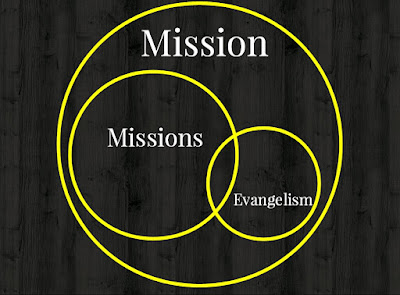What Is Missions?
In defining the term “mission” and “missions”, it is important to recognize that it is not found in the Bible, unlike covenant, justification, or gospel, for example. Mission comes from the Latin verb, mittere, which corresponds to the Greek verb apostellein (to send), but the word never occurs in a noun form that could be translated as “mission”. The definition of the term is therefore up for discussion.
A. Misused Passages
B. The Great Commission Passages
As seen here, both missions and evangelism fall completely within the scope of the church’s mission. The two also overlap. However, not all evangelism will be considered missions, but only that which intentionally directs the evangelized into a local church for the purpose of discipleship.
It is also important to
distinguish between the terms “mission” and “missions”.
Modern theologians use mission
to refer either to God’s mission in the world (i. e., His
redemptive plans) and the church’s mission as received from the
Lord and laid out in Scripture. Meanwhile, missions
refers to various undertakings of the Church toward fulfilling its
one mission.
There
is significant disagreement even among conservative evangelicals on
what the church’s mission is. According to authors Kevin DeYoung
and Greg Gilbert,
From
many conversations in print, online, and in person our sense is that
this whole issue of mission (along with related issues like kingdom,
social justice, shalom, cultural mandate, and caring for the poor) is
the most confusing, most discussed, most energizing, and most
potentially divisive issue in the evangelical church today. It is
certainly a likely fault line in the so-called young, restless, and
Reformed movement.
(Kevin DeYoung & Greg Gilbert, What Is the Mission of the Church?, p. 25.)
It
is therefore important to have a biblically informed understanding of
mission
since this will have important implications on the secondary issue of
missions.
Aside
from having a correct understanding of the broad themes of Scripture,
the most important step to developing a biblical definition of
mission
is to look at key passages, particularly the Great Commissions of the
Gospels and Acts, as well as the example of the apostle Paul. Before
this, however, it will help to consider some other passages that have
been wrongly suggested as defining the mission of the church.
A. Misused Passages
Genesis 12:1-3.
Some argue from this passage that the heart of God’s mission and
ours
is to be a blessing. However, such an interpretation is problematic
because as this promise unfolds in the story of the patriarchs, it
becomes clear that God was the one who blessed the patriarchs and
those who treated them as friends. Abraham did not take his call in
chapter 12 as a command to go find ways to bless the nations. In
fact, from a broader biblical perspective, the promise to Abraham is
not focused on him and his descendants bringing God’s blessing to
the nations, but on his Seed, the Messiah, as being the blessing (cf.
Gen 3:15 and Mat 1:2).
Exodus 19:5-6.
Some
argue that Israel’s identity as a “kingdom of priests” meant
that they were to be intermediaries for God’s blessing to the
world, and that therefore the church has the same role. But this view
wrongly assumes that the mediatorial role of the Levitical priesthood
was about incarnating
God’s presence,
when in fact, Scripture’s emphasis is on their responsibility to
propitiate God’s wrath against sin (cf. Hebrews 4:14-5:10; 7:1-28;
10:1-18). If Israel was indeed responsible for going out to bless the
nations, then why did the prophets never rebuke the nation for such
negligence?
Luke 4:16-21.
According to many, Luke 4 shows that Jesus’ mission was focused on
good
deeds toward
the materially poor and oppressed. Sadly, this ignores the
thrice-repeated verb, proclaim,
which carries the force of the passage. Although Jesus healed, His
primary ministry was to proclaim
the good news. What DeYoung and Gilbert said of Jesus’ healing
ministry can also be said of His ministry to the poor and oppressed:
Don’t
miss this fact: there
is not a single example of Jesus going into a town with the stated
purpose of healing or casting out demons.
He never ventured out on a healing and exorcism tour. He certainly
did a lot of this along the way. He was moved with pity at human need
(Mark 8:2). But the reason he “came out” was “that [he] may
preach” (1:38).
(DeYoung-Gilbert, p. 5)
B. The Great Commission Passages
Some
missiologists argue that we must define mission
based only on imperatives from some isolated passages, but rather see
the entire Bible as calling us to join in the mission of God.
However, this requires an
unbiblical assumption that our mission has the same scope as God’s.
In fact, there are clearly aspects of God’s mission that we have
nothing to do with, such as the slaying of the wicked, dying for the
sins of the world, the inauguration and consummation of the kingdom,
regenerating spiritually dead souls, and creating the new heaven and
earth. Therefore, instead of adopting a hermeneutic that assumes a
priori
that all of God’s mission is to be our own, it
is better to be directed by specific commands given to the church,
ie, the “Great Commission” passages.
Matthew 28:16-20.
This passage shows that the church’s primary mission is to make
disciples, not
simply to bless others in a general way. Because all of the apostles
were Jewish, they would have clearly understood that nations
referred
to here were the Gentile nations. Therefore, this passage promotes
work that crosses ehtnic, cultural, and geographical boundaries. The
authority to do this comes from Christ, who in turn has received this
authority from the Father.
Mark 13:10 and 14:9.
Unlike
the other Gospels, Mark does not include a post-resurrection Great
Commission in his account (assuming, as most evangelical scholars do, that Mark really ends with 16:8.) Nevertheless, 13:10 and 14:9 contain implied imperatives that the
disciples must proclaim the gospel to all nations throughout the
whole world.
Luke
24:44-49.
This Great Commission tells us that the primary content of the
church’s message must be repentance
and forgiveness
of sins
in the name
of the crucified and resurrected Christ. The promised Holy Spirit
will empower the church to fulfill this mission. Like Matthew, Luke
records Christ’s emphasis on proclamation to
all nations.
But Luke adds that this will begin from
Jerusalem.
Acts 1:8.
The Great Commission in Acts is particularly important because what
follows it is the history of precisely how the apostles and the New
Testament church fulfilled their calling to be Christ’s witnesses.
We see a church committed primarily to a mission of proclaiming the
gospel and making disciples. Works of charity are explicitly said to
be of subordinate importance to “prayer and the ministry of the
word” (Acts 6:4). This emphasis on disciple-making through gospel
proclamation is carried out, first in Jerusalem (Acts 2-7), Judea and
Samaria (8), and to the end of the earth (9-28).
C.
Paul’s Missionary Example
Since
Paul is the missionary par
excellence
of the Bible, his perspective on gospel ministry to the nations shows
us how he applied Christ’s instructions in the Great Commissions.
The
book of Acts includes two accounts of Christ’s commission to Paul.
The first and more familiar one from Acts
9:15-16
is
also the shorter one:
15
But the Lord said to him, “Go, for he is a chosen instrument of
mine to carry
my name
before the Gentiles and kings and the children of Israel. 16 For
I will show him how much he
must suffer
for the sake of my name.”
How
was Paul to carry
Christ’s
name
to others? What would this look like? We are only told here that it
will be accompanied by suffering, but the means of fulfilling this
commission is revealed more clearly in the second account in Acts
26:12-18.
16 But
rise and stand upon your feet, for I have appeared to you for this
purpose, to appoint you as a servant and witness
to the things in which you have seen me and to those in which I will
appear to you,
17 delivering you from your people and from the Gentiles—to
whom I am sending you 18 to open their eyes, so that
they may turn from darkness to light and from the power of Satan to
God, that they may receive forgiveness of sins and a place among
those who are sanctified by faith in me.’
Paul
was appointed as a servant
of Christ, with the specific responsibility to witness
to
the gospel of Christ. Paul’s objective was, to
open people’s
eyes to
their desperate situation and turn to God for forgiveness and
sanctification. (The sanctification referred to here is definitive or
positional rather than progressive.) Paul pursued this objective by
declaring
(ἀπαγγέλλω) to people that they should repent and turn to
God (cf. verse 20). Paul did not go from city to city in order to
heal the sick and uplift the materially poor, but to show people the
way of salvation and form them into healthy congregations by
preaching “the whole counsel of God” (Acts 20:27).
This
is further emphasized by the fact that Paul expected his
congregations to be evangelistic communities: the Thessalonians (1
Thes 1:8; 2:13-16; and 3:1), the Philippians (Phil 1:12-18), the
Ephesians (Eph 6:15, 19), the Corinthians (1 Cor 4:16; 7:12-16; 11:1;
and 14:23-25), and Titus’ congregation (Tit 2:1-10).
D.
What Is the Church’s Mission?
What
is, therefore, the Church’s mission? We might put it this way: The
Church’s mission is to make disciples of all nations by preaching
repentance from sins and faith in Christ for salvation, and
[gathering/grafting/establishing] these disciples into local churches
that they may worship and obey the Lord as a people set apart for
Him.
This
would would call for every member of the church to participate in
missions work in
a way that is appropriate to their ability.
Moreover, church should cultivate in each member a mindset of being
an active and accountable partner
in missions, not merely a passive supporter. (See Trevor Holloway, “From Spectators to Teammates: A Better Approach to Funding Missionaries”, <http://reachingandteaching.org/2017/06/spectators-teammates-better-approach-funding-missionaries.html>.)
E. Missions and Evangelism
What
then is the relationship between “mission,” “missions,” and
“evangelism”? This is illustrated in the diagram below.
Figure
1: Mission, Missions & Evangelism
As seen here, both missions and evangelism fall completely within the scope of the church’s mission. The two also overlap. However, not all evangelism will be considered missions, but only that which intentionally directs the evangelized into a local church for the purpose of discipleship.
By
implication, any ministry that engages in evangelism without a
long-term discipleship strategy will fall outside the purview of the
Missions Program. This does exclude it from endorsement by the
church, but it will not be considered a missions activity.



